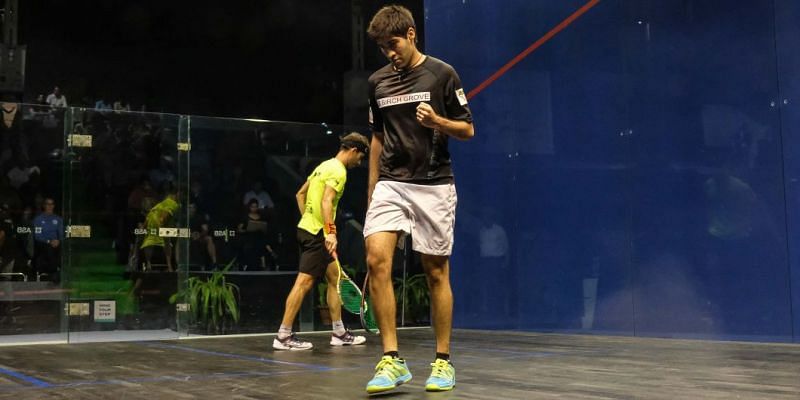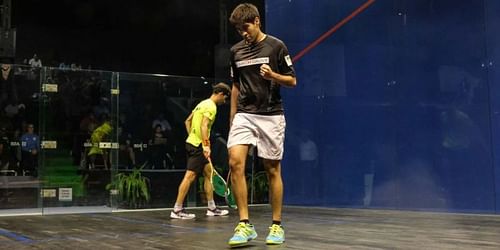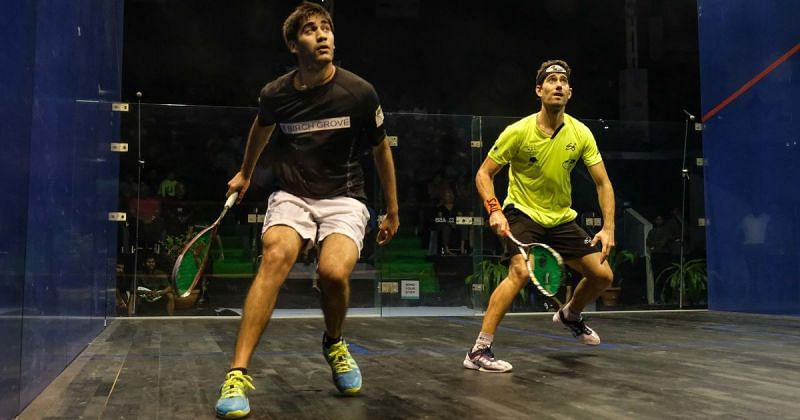
"The journey has just started and we have a long way to go and a lot more to achieve" says Indian squash player Ramit Tandon

Ramit Tandon is an Indian squash player who is named in the Men's Team for the 2018 Asian Games. He also participated in CWG 2018 where he partnered Vikram Malhotra in the Men's Doubles events. He is a graduate from Columbia University where he was the captain of the squash team.
In an exclusive interview with Sportskeeda, Ramit Tandon talks about his squash experience with the Indian team and Columbia University.
SK: What prompted you to choose Squash as your career? Who has supported you during your ups and downs?
Ramit: I always believe, you can’t choose a sport as a career. When you start playing a sport no one can decide there and then that he or she is going to make a career in it. You start because you enjoy it and somewhere down the road it becomes a passion and one sticks to it. It just happens.
For me, it was a slightly different journey. After graduating from Columbia University in 2015, I worked at a hedge fund in NYC called Birch Grove Capital for two years (2015-2017). Usually, players turn pro right after college but I wasn’t willing to take that risk. You can’t blame me for it, the sad truth is that squash isn’t as big as cricket or tennis. After completing my under-graduation with a BA in Statistics, the opportunity cost is way too high.
During my “working phase”, I missed competing on tour and after being encouraged by some top players and having some decent results I decided to give professional squash a go. As they say, love always wins, my love/passion for the game pulled through.
The President of Birchgrove Capital Mr. Andrew Fink and Ed Shugrue CEO Talmage(both my mentors in the finance world) and both are squash enthusiasts got me comfortable with the risks. I played my first event as a full-time squash player in Mumbai (November 2017).
I have been very lucky to be surrounded by some great people who understand that ups and downs are a part of an athletes journey. My parents, my younger brother and coaches are always there for me. I’m surrounded by a close circle of friends who stand by me through thick and thin.
SK: You recently won the Abu Dhabi Squash Open by upsetting the top seed Omar Abdel Meguid. How would you like to analyse your performance out there?
Ramit: Prior to Abu Dhabi Open, I participated in the Commonwealth Games. Shrugging shoulders with such great athletes across all sports was a huge inspiration for me.
Post the games, I had a few solid weeks of training with my fitness coach Anwar Wahab to prepare for the event.
Going into the event I felt mentally fresh and confident. That’s usually the key, the confidence carried me through.
Overall I was pleased with my performance and happy to lift the trophy. Omar is an amazing player and has been on tour for many years. He’s very experienced and has a unique style of squash. Playing him is very challenging.
In terms of squash, I was good in patches, there are still areas I need to work on. I don’t get satisfied very easily!
SK: Your world ranking was 400th in 2017. In just a matter of one year, you reached at the 65th rank. Whom do you want to credit for this accomplishment?
Ramit: It has been a team effort- a lot of people deserve credit for this. My parents for their support, my younger brother who’s pretty much like my coach, my fitness coach Anwar Wahab, the New York Athletic Club, The Saturday Club, Dalip Tripathi who helps me when I’m in Kolkata, Mreenal Chakraborty(mental coach), Cyrus Poncha(National Coach), the Columbia University squash family and my sponsors. I can say they all have been on this roller coaster ride with me, feeling all the emotions, all the ups and downs. I’m very thankful to them. And of course, my well-wishers who believe in my ability and support me unconditionally.
The journey has just started and we have a long way to go and a lot more to achieve.

SK: You've been named in the men's team who's going to represent India in the 2018 Asian Games. How is your training going on for this event?
Ramit: It’s always an honor representing India. The Asian games are probably the most important event on our calendar this year.
Right now it’s our offseason on the world tour. I have been working very hard with my fitness coach Anwar Wahab- mostly doing offseason (gym and track) stuff. The plan is to focus on my fitness until mid-July and then I’ll start focusing on my squash leading up to the event.
Anwar has a solid fitness plan laid out for me. I just have to show up and be prepared to grind. I’m fortunate to have someone like him who I can trust completely. I have been training under him since I was 10 years old so he understands me very well.
Post the fitness stint, I plan on spending some time in NYC to spar with some of the best players in the world before the games.
SK: Which particular point of your life would like to call as the turning point of your career?
Ramit: I think my move to the US (Columbia University) was a turning point in my career. Columbia University is an amazing school and academically very challenging. Columbia provided me with a good balance between education and high level of the sport. I wasn’t willing to sacrifice one for the other and the balance was very important to me.
In terms of squash, NYC gave me an opportunity to blend with some of the best players in the world who train there. I got to hit with some top 20 players on a weekly basis. This phase helped me mature as a squash player.
I can’t really pinpoint a certain event or incident- my pro squash career has just started, it hasn’t even been a year. Maybe all will be able to answer this a year or two from now.
SK: You were the captain of the squash team at Columbia University. How did the squash atmosphere help you in improvising your game?
Ramit: Squash is a very lonely sport- college squash is the only league where you have 10 players on a team + a few reserves. You feel the team spirit, it’s something that squash players usually don’t feel. Some of my best friends today were on the squash team with me. It’s a unique experience!
It was an honor to captain the Columbia squash team. I’m very proud of what we have achieved as a team and I still follow their progress very closely.
I don’t think I have come to terms with the fact that I’m not on the team anymore! My friend Anchit (was my captain at Columbia University) who’s from Mumbai but is working in NYC keeps reminding me that I’m done with Columbia Squash and I need to move on. I wish we could have a similar league for MBA programs as well!
At Columbia, I benefited by a few different aspects-
1) Coping with the pressure. Life of a student-athlete isn’t easy but it teaches you work ethic, discipline and time management. These traits have even helped me as a squash player.
2) Trust me when I say this, in college you play in a crazy atmosphere- you get them all from frat gods to some very passionate fans rooting for or against you. It helps build focus and teaches you how to deal with such pressure.
3) The training at Columbia is very systematic- we have weekly weight room sessions, track sessions, psychology sessions. All the facilities are right there for you.
4) The most essential factor for me- access to the NYC squash community. Since a lot of top players are based here you get exposed to a high level of squash.
SK: We've reached halfway through this season. What are your plans for the rest of the season?
Ramit: The squash season runs from September to May. June/July is our offseason. My first tournament next season is going to be the Asian Games. I’m yet to finalize the other tournaments on my calendar.
I will most likely be participating in the Kolkata International in November and the CCI International (Mumbai) in December. Would love to play in front of my home crowd. I don’t get to do that often.
SK: There are various youngsters who are developing an interest in squash and wish to make it as their career. What piece of advice would you like to give to them?
Ramit: You got to enjoy what you do and if you want to make a career in squash you got to really love the sport. You have to stick to the basics, nothing really changes.
You still got to put in the hours, be disciplined, make sacrifices. And you always have to be honest- sport has the power to make you feel like a king one day and the next day you might feel like you have forgotten how to hit the ball but the truth always lies in between!
What did you think about the comments from Ramit Tandon? Sound off your opinions in the comment section below!